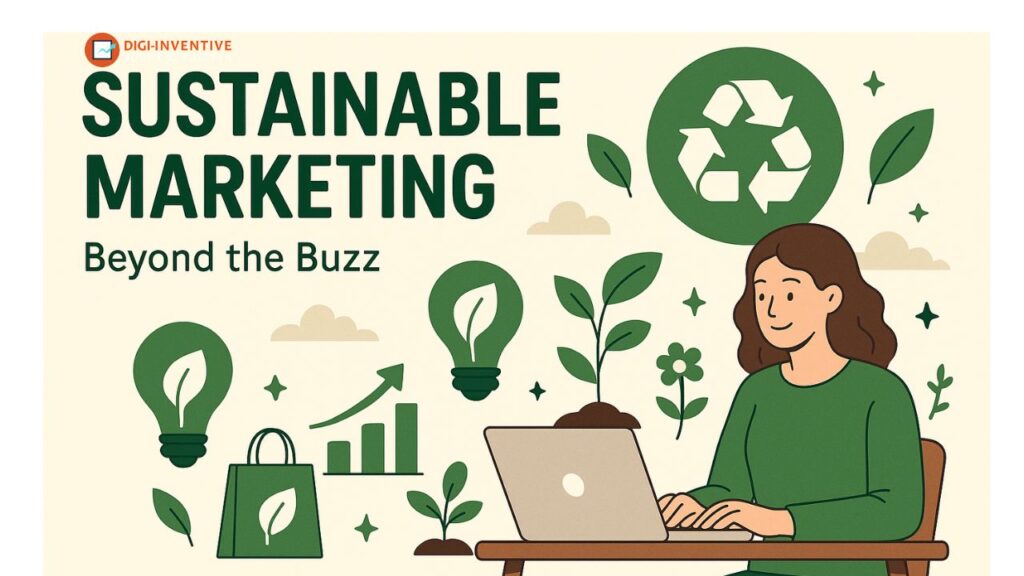Marketing: Sustainable Strategies Beyond the Buzz
The modern consumer deeply cares about the world. They now expect brands to reflect their values. Furthermore, this isn’t a fleeting trend. Sustainable marketing is no longer optional. Instead, it’s now central to brand communication and the digital marketing services they employ. This alters how businesses truly engage with their audience.
Why Conscious Consumption Matters
Consumers are increasingly informed today. Indeed, they actively seek brands that stand for positive change. Studies show a strong willingness to support ethical companies. This holds especially true for younger generations. Clearly, they prioritize social and environmental impact. Ignoring this vital trend means missing crucial connections. Therefore, understanding this significant consumer shift is paramount for success.

Integrating Values into Brand Messaging
Brands embed responsibility into their core identity. This is not just a passing marketing tactic. It signifies a genuine commitment to purpose. Companies redefine their overall mission. They align it with broader societal values. This approach fosters deeper consumer relationships. For instance, businesses adopt sustainable sourcing methods. They implement eco-friendly production processes. Ethical labor practices are also crucial. Fair trade initiatives build essential trust. These actions truly resonate with conscious consumers. Consequently, brand loyalty grows stronger.
Key Strategies for Ethical Marketing
One key strategy is transparent communication. Brands must be honest about their efforts. Share both successes and challenges openly. Authenticity builds strong credibility. Avoid “greenwashing” at all costs. Consumers quickly spot deceptive claims. This can severely damage brand trust.
Another vital approach is product innovation. Develop truly eco-friendly products. Modify existing items to reduce their environmental impact. Use recycled or sustainable materials. Design for energy efficiency and long product life. This showcases a commitment to the planet.
Community involvement is also highly powerful. Partner with local causes or NGOs. Support initiatives that align with your brand’s purpose. This demonstrates genuine commitment. It also builds goodwill in the community. Furthermore, it creates a positive brand image.
Brands are actively leveraging impactful storytelling. Share the authentic journey behind your efforts. Show the tangible effects of your actions. Emotional narratives connect deeply with people. This makes consumers feel connected.
The Role of Digital Marketing in Promoting Purpose
Digital marketing services are essential for this shift.Brands can easily showcase their commitment online. For instance, websites can detail comprehensive sustainability reports. Social media amplifies purpose-driven campaigns globally. Email marketing can then share impactful stories directly.
Digital advertising can target conscious consumers precisely. SEO helps ethical brands appear in search. Content marketing educates audiences further. It explains sustainable initiatives clearly. This helps build informed, loyal customers through digital marketing. Consequently, brands expand their reach and influence.
Benefits Beyond Brand Reputation
Integrating purpose yields numerous benefits. First, it significantly enhances brand reputation. Furthermore, it builds strong, enduring customer loyalty. This draws skilled professionals. Employees desire to work for values-aligned businesses. Consequently, this boosts both morale and employee retention significantly
Purpose-driven marketing differentiates brands effectively. It fosters a strong competitive advantage. Firms can secure premium prices for their goods; companies like Himalaya Wellness, for instance, often demonstrate this.. It proves that profitability and positive impact can coexist. Ultimately, this leads to long-term business success.
Navigating Challenges in Sustainable Practices
Challenges certainly exist, like consumer skepticism. The risk of greenwashing is always present. Hence, ensuring complete transparency is key. Also, measuring true impact can be complex. Brands need clear, verifiable metrics. This demonstrates vital accountability.
Despite these potential hurdles, the direction is undeniable. Ethical marketing and purpose-driven initiatives are shaping tomorrow. Brands actively embracing this shift will truly flourish. They will forge robust customer connections. Additionally, they will positively impact the world. Adopting this stance is a vital element of modern digital marketing.

